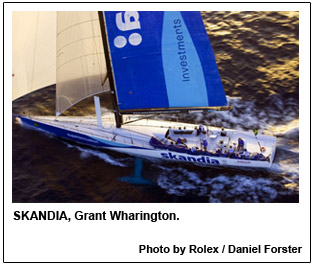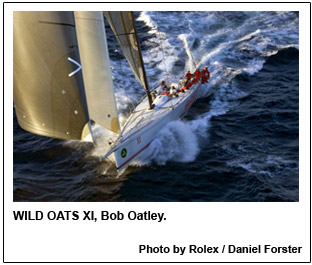| Skandia Spoiling Oat's Parade
December 27, 2008
 The four years older Skandia continued to lead her supercharged rival Wild Oats XI at the head of the Rolex Sydney Hobart fleet today, confounding all pre-race predictions including those of her skipper Grant Wharington. Before the start Wharington had said, "on an even day we believe Wild Oats is two hours faster than us to Hobart, just because of their design being four years newer. They've also got a thinner keel and rudder foils." So he had focussed on configuring Skandia to win the race's major prize, the Tattersalls' Cup for the overall winner on IRC handicap. The four years older Skandia continued to lead her supercharged rival Wild Oats XI at the head of the Rolex Sydney Hobart fleet today, confounding all pre-race predictions including those of her skipper Grant Wharington. Before the start Wharington had said, "on an even day we believe Wild Oats is two hours faster than us to Hobart, just because of their design being four years newer. They've also got a thinner keel and rudder foils." So he had focussed on configuring Skandia to win the race's major prize, the Tattersalls' Cup for the overall winner on IRC handicap.
Both yachts are 30m (98ft) overall and are equipped with canting keels. Don Jones of Melbourne designed Skandia for Wharington. The San Diego partnership of John Reichel and Jim Pugh designed Wild Oats XI, for Bob Oatley of Sydney. Wild Oats XI set the current race record at one day 18 hours 40 minutes and 10 seconds in her first Rolex Sydney Hobart in 2005 and has prepared strongly to record her fourth consecutive line honours win and to break her own record in this race.
Modifications for greater downwind speed included installing a lighter keel bulb and adding new, bigger, Volvo 70-style furling reaching sails to her wardrobe. However in this downwind race, Skandia passed Wild Oats XI when the fresh 20-25 knot northeasterly faded off the southern coast of New South Wales in the early hours of yesterday morning. Skandia, appearing to run deeper angles in the light wind, gained a narrow lead. Her navigator Graeme Taylor said: "We made some very good calls on wind shifts through the night and picked up four and a-half knots of favourable current."
The northerly gradient wind freshened again after dawn and was up to 28 knots by 1300 AEDT, putting the leading yachts on course for Tasman Island at good speeds. At 1700 AEDT, Skandia was still leading, 68 nautical miles east of St Helens on the Tasmanian coast and 190.7 nm from the finish, doing 15.1 knots. Wild Oats XI, five miles further inshore, was only 3.3 nm behind, doing 16.7 knots and gaining.
Navigator Ian Burns reported from Wild Oats XI that she had been engaged in a gybing duel with Skandia during the afternoon, with Skandia giving little opportunity to pass. Wild Oats XI was currently running hard in a strong 28-knot northerly and reaching speeds of up to 25 knots under her new 900sq m 'Super Whomper' spinnaker. "This is good racing; great sailing," said Burns. "We hit a calm patch a while back but now, with the wind picking up, we are just working hard to chase and catch Skandia."
However the race record looks likely to elude both Wild Oats XI and Skandia. They would have to finish before 0740 AEDT tomorrow to break it. They could do if they sustained the 15-knot plus speeds they were doing during the afternoon. But that seems unlikely with the northerly expected to die overnight for the last difficult 41 nm from Tasman Light across Storm Bay and up the last 11 nm against the Derwent River current to the finish.
The IRC handicap leader at 1700 AEDT was reckoned to be Alan Whiteley's TP52 Cougar II, followed by Syd Fischer's TP52 Ragamuffin, both Farr designs, followed by Ray Roberts' canting-keeled Cookson 50 Quantum Racing, also designed by Farr.
 The international entries have yet to leave a serious mark on this year's contest. Ragtime (USA) is defying the odds given her age by keeping up with yachts some 35 to forty years younger than her and in some cases larger than her. Halfway across Bass Strait this evening, Chris Welsh and crew will no doubt be satisfied to be lying in 17th place on the water and 11th overall on handicap. Walross IV (GER) is next on the water, but the German crew is only just entering Bass Strait and will require an exceptional performance to make up the lost ground on handicap. The experienced French offshore racer, Gery Trentesaux is also finding the going tough on Lady Courrier. He is just in the Strait with Ian Darby's Jus' Do It (GBR) and Jean Luc Esplaas' 41 Sud (New Caledonia). Right at the back is Pachamama (SUI). Dario Schwoerer is en route to Eden to shelter overnight. "We saw a satellite image of the frontal system heading to Bass Strait and we are always careful with the weather, so we're on our way into Eden to let the approaching front come past. We hope to be in there around 9-10 o'clock this evening. When we leave will depend upon how the weather develops. It may be that we can continue tomorrow," he advised. The international entries have yet to leave a serious mark on this year's contest. Ragtime (USA) is defying the odds given her age by keeping up with yachts some 35 to forty years younger than her and in some cases larger than her. Halfway across Bass Strait this evening, Chris Welsh and crew will no doubt be satisfied to be lying in 17th place on the water and 11th overall on handicap. Walross IV (GER) is next on the water, but the German crew is only just entering Bass Strait and will require an exceptional performance to make up the lost ground on handicap. The experienced French offshore racer, Gery Trentesaux is also finding the going tough on Lady Courrier. He is just in the Strait with Ian Darby's Jus' Do It (GBR) and Jean Luc Esplaas' 41 Sud (New Caledonia). Right at the back is Pachamama (SUI). Dario Schwoerer is en route to Eden to shelter overnight. "We saw a satellite image of the frontal system heading to Bass Strait and we are always careful with the weather, so we're on our way into Eden to let the approaching front come past. We hope to be in there around 9-10 o'clock this evening. When we leave will depend upon how the weather develops. It may be that we can continue tomorrow," he advised.
Pachamama is a cruising boat and sailing short-handed, so her prudence is understandable. Even with this possible set-back to the aim to finish before New Year's Eve, Schwoerer is in no doubt that their participation has been worth it, "The start was wonderful, very exciting with all the other boats around. Seeing the helicopters in the sky and all the people on boats and the shore cheering was something we have never experienced before. Once we were out of the harbour we have been sailing most of the time with 14-15 boats around us. Something we are not used to in the remote places where we usually sail. Whatever happens (next) we wish all the other boats racing hard in the Bass Strait all the best and see them soon."
There have been three retirements so far. Graeme Ainley, the skipper of the Farr 53 Georgia which sank last night after her 14 crewmembers were taken off by another competitor, the Volvo 60 Telcoinabox Merit, explained the circumstances on reaching Batemans Bay aboard the police launch Nemesis, "we were running under spinnaker at about 15 knots, having just completed the radio sked. We heard a loud bang, followed by a second bang. I guess we must have hit something reasonably solid, but we couldn't see it. The rudderstock had pulled out and water came through the back of the boat. We then had no steering and had to get the spinnaker down quickly."
Unable to stop the influx of water, Ainley's crew decided to abandon Georgia. Ainley said the race's radio relay vessel JBW had managed the whole situation in "an excellent and professional manner" and the sea safety and rescue courses Rolex Sydney Hobart crewmembers have to complete helped the rescue to go according to plan." Ainley and his crew watched Georgia sink, about half an hour after their rescue, while they were aboard Merit waiting for Nemesis to arrive.
The second retirement from the 100-boat starting fleet was Ian Kiernan's immaculately restored 50-year-old Tasman Seabird yawl Sanyo Maris. She broke the main boom's gooseneck while running hard under spinnaker in 30 knots of northeasterly off Jervis Bay on the south coast of New South Wales. "It wasn't repairable out here so with regret we retired at around 1AM," Kiernan said. "Given the Green Cape rule we didn't think it would be acceptable to enter Bass Strait," he added. The Sailing Instructions insist that as competing boats reach the latitude of Green Cape, the mainland departure point for Tasmania across Bass Strait, they must notify the radio relay vessel JBW and declare their fitness to continue racing.
A third retirement, the Farr 40 Inner Circle (Ken Robinson/Darren Cooney), with generator failure has left 97 boats still racing to Hobart.
Bob Oatley's Wild Oats XI established the current Course Record of 42 hours 40 minutes in 2005. In order to better this time the first yacht needs to be at the finish in Hobart before 0740 AEDT on Sunday 28th December.
The 100-boat fleet that started the 64th Rolex Sydney Hobart has crews representing the USA, UK, New Zealand, France, Germany, the Netherlands, Switzerland, Russia and New Caledonia as well as every Australian state.
For more information about the Rolex Sydney Hobart 2008 including the entry list, yacht tracker and results please visit the event website at www.rolexsydneyhobart.com
TOP
|